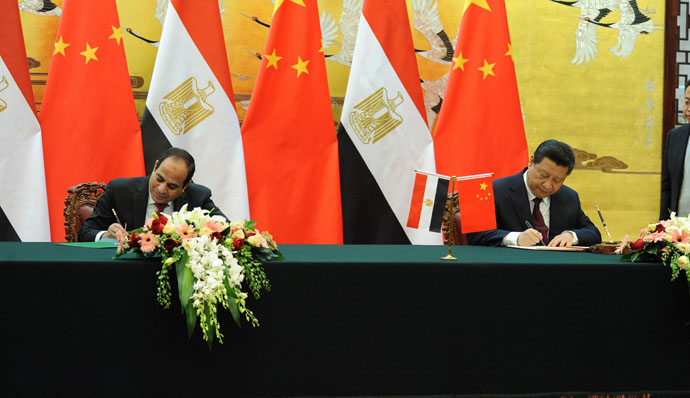By Mahmoud Hammad
Tripartite MOU on the new expansions with $188m investments
Establishment of the first insulin factory in Egypt, and $100bn pharmaceutical investments
Under the endeavors of the Ministry of investment to develop public companies, and enhance their contribution to the national economy; and out of its keenness to support and boost national industries, implement its expansionism policy, and optimize its assets; the Ministry signed an agreement on restructuring and developing some government companies for spinning and weaving.
Under this agreement, the development of 25 subsidiary companies of thIndustries Holding Company (CTIHC), out of 32, is due to begin early February 2016, for a period of 43 weeks only.
Minister of Investment, Ashraf Salman, witnessed the signing of this agreement between CTIHC and the US Warner International Co., for consulting services and technical and analytical studies, in the presence of Chairman of CTIHC Dr Ahmed Mustafa.
Mustafa declared in a speech that textile factories need a full restructuring due to their outdated machinery; pointing out that CTIHC is carrying out financial, technical, analytical, and marketing studies; and a full assessment on its factories and all of their machinery, equipment, facilities, and movable and immovable assets. It will also examine the methods and capacity of production, and will compare them to the average levels; in addition to exchanging expertise with several countries that has developed its cotton and textile sector, within 301 days and according to a specific schedule.
In the meantime, Salman announced that a public tender was issued for national and international consulting offices specialized in textile and cotton to assess the state of CTIHC subsidiary companies, set development plans, conduct studies on their marketing activities, offer modern methods to attract clients and open new markets, and finally to provide suggestions for increasing the technical skills of the labour force through transformational training programmes.
Salman also confirmed that the great competitive potentials of Egypt concerning the cotton and textile industry, in addition to its being a labour-intensive one, render it significant importance. He stressed the need to develop this industry, and to use in all manufacturing phases using the most advanced technologies in the world.
On the sidelines of China President’s visit to Egypt, Salman signed a tripartite MOU; including the Ministry, a Chinese glass fabrics manufacturer, and the China Development Bank (CDB), on the new expansions of the company with $188m investments and an annual production capacity of 80,000 tonnes. The Chinese glass fabrics manufacturer in Egypt operates a factory for producing all kinds of glass fabrics (woven-strands-threads) on three phases to reach a total production capacity of 220,000 tonnes per year by 2017, and total investments of $520m.
The tripartite MOU provides for increasing production, labour force, and training programmes of the Chinese glass fabrics manufacturer; in addition to transferring expertise in the field of glass fabric manufacturing, and developing products to cope with the international developments in this industry.
Salman also signed an MOU between HoldiPharma and a Chinese insulin and pharmaceutical raw biomaterials company for the purpose of establishing joint Chinese-Egyptian cooperation and investments in this field.
By virtue of this MOU, the first insulin factory will be established in Egypt which will produce, in addition to insulin, another 30 types of the most expensive and top imported raw materials. Moreover, negotiations are being currently held with the Chinese insulin company on the implementation of a number of strategic pharmaceutical projects with $100bn direct foreign investments.
Salman welcomed the visit of China’s President to Egypt, which is within the framework of boosting the Chinese-Egyptian relations; especially the economic and investing relations. During this visit, a number of MOUs were signed to establish joint developmental projects in the fields of electricity, transport, E-education, training, infrastructure, anti-desertification, and space science. China’s President was accompanied by a huge delegation of major Chinese corporations interested in the Egyptian market to get to know the available opportunities to invest in Egypt and boost the economic relations between both countries.
Finally, Salman welcomed the enhancement of the Chinese investments in Egypt, and joint cooperation in other fields; pointing out that the MOUs signed in the pharmaceutical, insulin, and glass fabric manufacturing fields are part of the constant efforts to establish a strategic partnership with the 2nd largest economy in the world.


